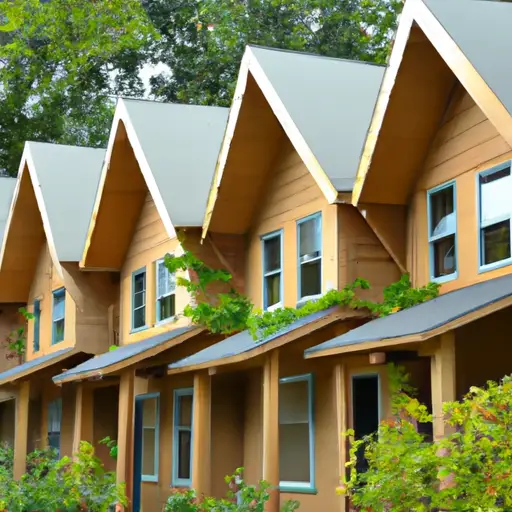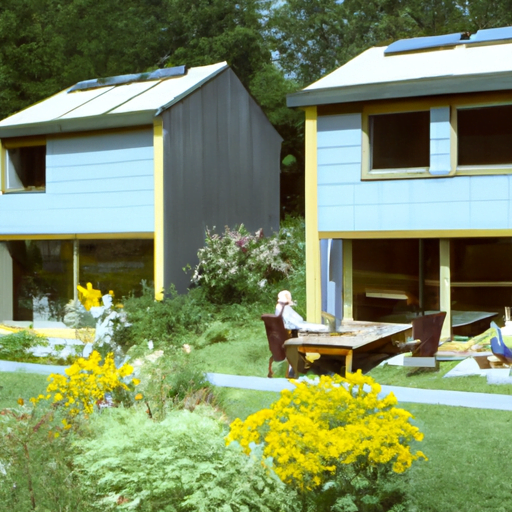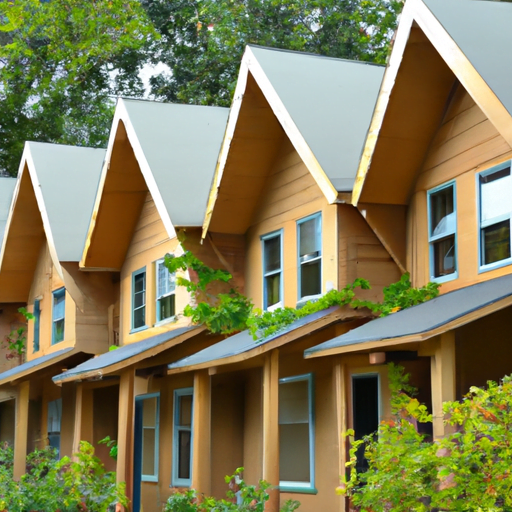Have you ever thought about going off the grid and embracing a sustainable lifestyle? Well, you’re not alone. With the rising concerns about climate change and the impact of human activities on the environment, more and more people are turning to eco-villages as a solution. So, what exactly are eco-villages and why are they gaining popularity?
Eco-villages are intentional communities that strive to live in harmony with nature while minimizing their ecological footprint. They promote self-sufficiency and sustainable practices, such as organic farming, renewable energy, and waste reduction. These communities aim to create a more sustainable and resilient way of living, where people work together and share resources.
The idea of living off the grid in an eco-village might seem daunting at first, but it offers numerous benefits. Not only do these communities help reduce our impact on the environment, but they also foster a strong sense of community and connection. Living in an eco-village allows you to learn valuable skills, such as permaculture and natural building techniques. So, if you’re curious to know more about how to embrace a sustainable lifestyle and whether eco-villages are the way of the future, keep reading our article.

Embracing a Sustainable Lifestyle: The Rise of Eco-Villages
In recent years, there has been a growing interest in eco-villages as people increasingly seek sustainable alternatives to conventional living. Eco-villages are intentional communities that focus on ecological and sustainable principles. They aim to provide a harmonious coexistence between humans and nature, promoting a more environmentally friendly and socially connected way of life.
Defining Eco-Villages
Eco-villages can be defined as intentional communities that are designed to minimize their impact on the environment and promote sustainable living practices. These communities often prioritize self-sufficiency, community cooperation, and the use of renewable resources. By integrating ecological design principles, eco-villages strive to create a symbiotic relationship between people and the surrounding environment.
Characteristics of an Eco-Village
There are several key characteristics that define an eco-village:
Sustainable Infrastructure: Eco-villages prioritize the use of renewable energy sources, such as solar panels and wind turbines, to meet their energy needs. They also focus on water conservation and management to reduce waste and promote sustainable water usage.
Shared Resources: Eco-villages encourage the sharing of resources among community members. From shared gardens to communal spaces, these intentional communities promote a sense of cooperation and mutual support.
Community Engagement: Strong community bonds are emphasized in eco-villages. Decision-making processes are often democratic and inclusive, ensuring that every voice is heard and respected.
Off-Grid Living: Many eco-villages embrace off-grid living, which involves living independently from the conventional power grid. This allows community members to rely on renewable energy sources and reduce their carbon footprint.
The Rise of Eco-Villages
The growing demand for sustainable living and the desire to live in harmony with nature has fueled the rise of eco-villages. People are increasingly seeking alternatives to the fast-paced, consumer-driven lifestyle commonly found in cities. Eco-villages provide an opportunity to embrace a simpler, more sustainable way of life.
Benefits of Eco-Villages
There are numerous benefits associated with eco-villages:
Environmental Sustainability: Eco-villages strive to minimize their ecological footprint by utilizing renewable energy sources, preserving natural resources, and promoting biodiversity conservation. By adopting sustainable practices, eco-villages play a vital role in mitigating climate change.
Improved Quality of Life: Living in an eco-village fosters a stronger sense of community and connection with nature. Residents often report a higher quality of life due to the social support, reduced stress levels, and healthier living environments that eco-villages offer.
Cost Savings: Off-grid living and the sharing of resources in eco-villages can lead to significant cost savings. By reducing reliance on external infrastructures and pooling resources, residents can enjoy a more affordable lifestyle.
Examples of Successful Eco-Villages
Across the globe, there are numerous successful eco-villages that serve as models for sustainable living. One such example is Findhorn Ecovillage in Scotland. Founded in 1962, it has become a thriving community known for its ecological design, renewable energy systems, organic gardens, and sustainable housing.
Another notable eco-village is Auroville in India. Built on the principles of human unity and sustainable living, Auroville strives to be a self-sufficient and spiritually inclusive community. It has gained international recognition for its alternative building techniques and renewable energy initiatives.
Embracing a Sustainable Lifestyle
Understanding the concept of sustainability is key to embracing a sustainable lifestyle. Sustainability refers to meeting our present needs without compromising the ability of future generations to meet their own needs. It involves finding a balance between social, economic, and environmental factors.
Embracing a sustainable lifestyle is important for many reasons:
Environmental Conservation: By adopting sustainable practices, we can reduce our ecological footprint and protect the planet’s natural resources for future generations.
Health and Well-being: Sustainable living often promotes healthier lifestyles, such as consuming local and organic food, engaging in physical activity, and reducing exposure to harmful substances.
Reduced Waste: Embracing sustainable practices encourages the reduction, reuse, and recycling of resources, leading to less waste and a more efficient use of materials.
How Eco-Villages Promote Sustainability
Eco-villages play a significant role in promoting sustainability. By creating intentional communities focused on ecological principles, they demonstrate the possibilities of sustainable living and provide a platform for education and awareness. Eco-villages inspire individuals and communities to make conscious choices that prioritize environmental well-being.
Off Grid Living in Eco-Villages
Living off the grid is a central aspect of many eco-villages. This involves relying on renewable energy sources and minimizing dependence on external power grids. Here are some key components of off-grid living in eco-villages:
Renewable Energy Sources: Eco-villages often utilize solar panels, wind turbines, and other renewable energy technologies to meet their energy needs. These sustainable energy sources reduce reliance on fossil fuels and contribute to a lower carbon footprint.
Water Conservation and Management: Eco-villages prioritize water conservation through rainwater harvesting, greywater systems, and efficient irrigation techniques. This ensures that water resources are used responsibly and sustainably.
Waste Management and Recycling: Eco-villages implement comprehensive waste management systems, encouraging recycling, composting, and minimizing waste generation. These practices reduce environmental pollution and promote a circular economy mindset.
Community Engagement in Eco-Villages
Strong community engagement and social connections are integral to the success of eco-villages. Here’s how eco-villages promote community engagement:
Building Strong Community Bonds: Eco-villages foster a sense of belonging and community through regular social activities, events, and shared spaces. Residents actively collaborate, support each other, and make important decisions together.
Shared Resources and Decision Making: The sharing of resources, such as tools, vehicles, and communal spaces, is a common practice in eco-villages. Decision-making processes are often participatory and democratic, ensuring inclusivity and addressing the needs and concerns of all community members.
Challenges and Solutions
Although eco-villages offer numerous benefits, they also face significant challenges. Some of the key challenges and their potential solutions include:
Land Acquisition and Zoning: Finding suitable land and navigating zoning regulations can be a hurdle for eco-villages. Collaboration with local authorities and engaging in community-driven zoning initiatives can help overcome these challenges.
Funding and Financial Sustainability: Securing funding for land purchase, infrastructure development, and ongoing maintenance can be a barrier for eco-villages. Exploring crowdfunding, grants, and partnerships with like-minded organizations can provide financial support.
Ensuring Long-Term Commitment: Sustaining an eco-village requires long-term commitment from community members. Clear communication, shared responsibilities, and ongoing education about sustainable living can help maintain enthusiasm and dedication.
Economic Impact of Eco-Villages
Eco-villages contribute to local economies in various ways:
Local Job Creation: Eco-villages often create employment opportunities within the community. From organic farming to renewable energy installation and maintenance, these intentional communities generate local jobs that support the local economy.
Sustainable Economic Practices: Eco-villages prioritize sustainable economic practices, such as supporting local businesses, fair trade, and ethical production. These practices promote economic resilience and contribute to the overall well-being of the community.
Positive Environmental Impact
Eco-villages have a significant positive impact on the environment:
Reduced Carbon Footprint: Through the use of renewable energy sources and sustainable practices, eco-villages contribute to reducing carbon emissions. This helps combat climate change and its adverse effects.
Preservation of Natural Resources: Eco-villages emphasize the responsible and sustainable use of natural resources, such as water and land. By adopting practices like organic farming and permaculture, they help preserve soil fertility and biodiversity.
Eco-Tourism and Education
Eco-villages provide opportunities for eco-tourism and education:
Promoting Eco-Tourism: Many eco-villages welcome visitors and offer eco-tourism experiences that allow individuals to learn about sustainable living practices. These experiences can be educational and inspire visitors to adopt more sustainable lifestyles.
Educational Programs and Workshops: Eco-villages often organize educational programs and workshops that teach individuals about sustainable practices, permaculture, renewable energy, and more. These initiatives help build awareness and empower individuals to make sustainable choices.
Conclusion
The growing significance of eco-villages in the current era cannot be overlooked. As people strive to embrace a more sustainable lifestyle and protect the environment, eco-villages provide a model for sustainable living that prioritizes ecological responsibility, community engagement, and a harmonious coexistence with nature. By embracing these principles, we can shape a sustainable future for ourselves and generations to come.





